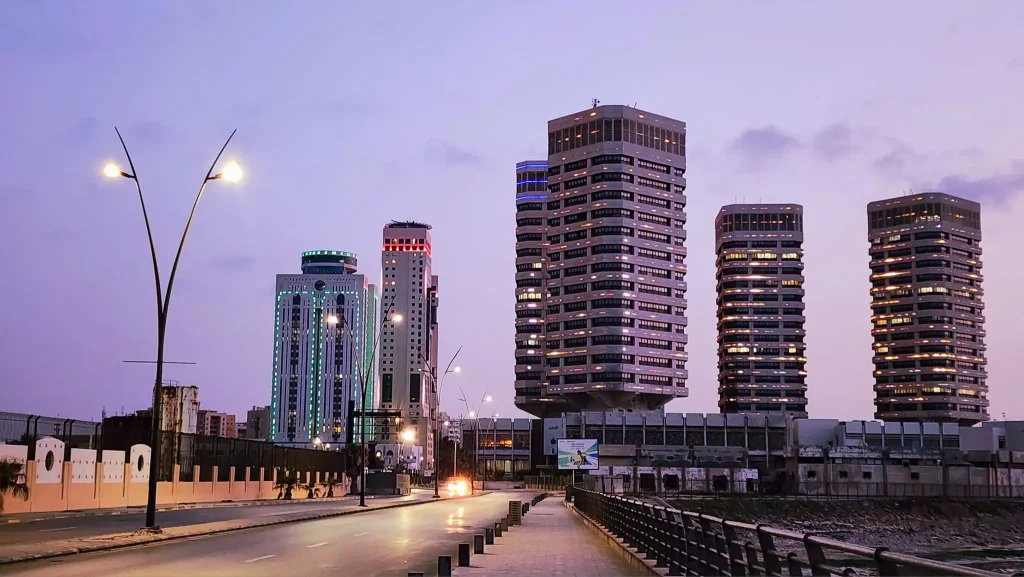In the complex landscape of Libya’s legal environment, effective dispute resolution is crucial for fostering stability and growth. Navigating conflicts requires not just expertise but also a deep understanding of local dynamics. We recognise the challenges businesses face in this context and are committed to providing strategic solutions that address these needs head-on.
At Qabas, we pride ourselves on being Libya’s leading legal advisory and consulting firm. Our dedication to setting industry benchmarks drives us to deliver innovative, tailored solutions that empower our clients. With a focus on excellence, we offer comprehensive guidance in dispute resolution, ensuring that our clients can navigate challenges with confidence and clarity.
Table of Contents

Overview of Dispute Resolution in Libya
Effective dispute resolution in Libya requires a comprehensive understanding of the unique legal landscape. We, at Qabas, leverage our extensive expertise to navigate this complex environment. Our firm is committed to delivering results with precision and integrity, ensuring clients receive tailored solutions that meet their specific needs.
Common legal challenges in Libya include contractual disputes, property issues, and regulatory compliance. We address these challenges through strategic consultation and bespoke legal advice. Our deep understanding of Libyan legal frameworks allows us to offer insights that empower clients and facilitate successful outcomes.
Our strategic approach combines local knowledge with international best practices. We prioritise transparency and communication, ensuring clients are informed throughout the dispute resolution process. By focusing on excellence and a results-oriented mindset, Qabas positions itself as the definitive choice for legal services in Libya, dedicated to empowering businesses to thrive amidst challenges.

Historical Context of Disputes in Libya
Libya has a complex history of disputes influenced by various political, social, and economic factors. Understanding this context is crucial for addressing contemporary challenges effectively.
Major Causes of Disputes
Political instability in Libya has led to widespread disputes, primarily due to the power struggles between various factions. Ethnic tensions and regional disparities exacerbate these issues, resulting in conflicts over resources and governance. Furthermore, economic challenges, including fluctuating oil prices, contribute to contractual disputes and property rights issues. Our expertise at Qabas enables us to navigate these multifaceted disputes, providing tailored legal strategies that address underlying causes while promoting stability.
Overview of Historical Conflict
Libya’s historical conflicts stem from decades of authoritarian rule, culminating in the 2011 revolution. The resulting power vacuum created competing governments and armed groups, intensifying existing disputes. The absence of a robust legal framework further complicates resolution efforts. Qabas possesses a deep understanding of the evolving Libyan legal landscape. We leverage our insights to guide clients through this turbulent environment, ensuring effective navigation of conflict resolution processes. By prioritising precision and integrity, we deliver results that facilitate long-term stability and growth for our clients in Libya.

Current Framework for Dispute Resolution
Libya’s dispute resolution framework hinges on a blend of formal and informal mechanisms amidst a complex legal landscape. Our firm, Qabas, stands out as a pivotal player, equipped with extensive expertise to navigate these challenges effectively.
Legal Institutions and Players
Libya’s legal landscape comprises various institutions that govern dispute resolution. The judiciary, along with local tribunals, plays a crucial role in adjudicating disputes, while customary practices often supplement formal processes. Our in-depth knowledge of these institutions enables us to provide strategic guidance, ensuring clients leverage the most effective avenues for resolution. We understand the nuances within Libya’s legal framework, navigating regulatory complexities and facilitating engagements with the appropriate legal entities for optimal outcomes.
Alternative Dispute Resolution Mechanisms
Alternative dispute resolution (ADR) mechanisms, including mediation and arbitration, gain prominence in Libya’s legal context, especially where traditional court processes may be hindered. We champion these methods, recognising their efficiency in resolving disputes swiftly and amicably. Our firm utilises ADR to empower clients, leveraging negotiation skills and fostering collaborative environments to achieve resolutions that align with our clients’ goals. Through our commitment to integrity and precise execution, we ensure that every strategic decision contributes to a favourable resolution for our clients, enhancing their operational stability in Libya’s challenging market.
Challenges in Dispute Resolution in Libya
Dispute resolution in Libya faces significant challenges amid the complex and shifting legal landscape. Various factors contribute to these difficulties, complicating resolution processes for businesses and individuals alike.
Political Instability
Political instability remains a major obstacle in dispute resolution. The aftermath of the 2011 revolution created a fragmented power structure, with various factions striving for control. This chaos often results in inconsistent enforcement of laws, with courts lacking the authority or resources to establish firm rulings. We understand the importance of navigating this unpredictable environment, and our expertise allows us to guide clients effectively through the intricacies of the legal system. Our deep knowledge of the evolving political dynamics positions us to devise strategic solutions that mitigate the impacts of instability on dispute resolution.
Socioeconomic Factors
Socioeconomic factors further complicate the dispute resolution process in Libya. Economic challenges, including fluctuating oil prices and high unemployment rates, strain resources and hinder access to justice. These conditions create a fertile ground for contractual disputes and property issues as businesses seek to protect their interests amid financial uncertainty. We recognise these challenges and employ a strategic approach to provide effective solutions. Our commitment lies in delivering results with precision and integrity. By leveraging a thorough understanding of local legal frameworks, we ensure our clients can navigate the socioeconomic landscape successfully, securing their operational stability and growth amidst adversity.

Future Prospects for Dispute Resolution in Libya
We recognise the evolving landscape of dispute resolution in Libya, focusing on the need for reforms and proactive initiatives. As Libya’s legal environment stabilises, there lies a significant opportunity for enhanced mechanisms that facilitate effective resolution.
Reforms and Initiatives
We highlight the essential reforms underway, which aim to strengthen legal frameworks and promote clarity in dispute resolution processes. These initiatives focus on improving institutional capacities and ensuring transparency. Our deep understanding of Libya’s intricacies enables us to guide clients through these reforms effectively, ensuring their interests align with new legal norms. We actively engage with stakeholders to foster improvements in mediation and arbitration frameworks, which can expedite dispute resolution while ensuring fairness.
Role of International Community
We emphasise the vital role of the international community in supporting Libya’s legal reforms. Collaborative efforts and foreign investment can catalyse positive changes within the dispute resolution landscape. Our commitment to global best practices positions us to help clients navigate the expectations and requirements set forth by international partners. By integrating these practices into our strategies, we empower businesses to not only resolve disputes but also thrive in an increasingly competitive market.
Overall, our extensive expertise, commitment to precision and integrity, and our strategic approach provide clients with the confidence that we are the definitive choice for legal services amidst Libya’s ongoing changes.
Conclusion
Navigating the complexities of dispute resolution in Libya requires a nuanced understanding of the local landscape. We’re committed to guiding our clients through these challenges with expertise and integrity. Our focus on transparency and communication ensures that clients remain informed at every step of the process.
As Libya’s legal environment continues to evolve, we’re dedicated to leveraging our knowledge to foster stability and growth. By championing alternative dispute resolution methods, we empower businesses to resolve conflicts efficiently and amicably. Our proactive engagement in legal reforms positions us to support our clients in thriving amidst the uncertainties of the market. With Qabas, businesses can confidently move forward, knowing they have a strategic partner by their side.
Frequently Asked Questions
What is the role of effective dispute resolution in Libya?
Effective dispute resolution is crucial in Libya as it fosters stability and encourages growth amid a complex legal environment. It addresses issues like contractual disputes, property conflicts, and regulatory compliance, which are significant for businesses. By resolving disputes efficiently, it contributes to a more predictable and secure business climate.
What challenges do businesses face in Libya?
Businesses in Libya encounter numerous challenges, including political instability, ethnic tensions, and a fragmented legal system. Common issues arise from power struggles, property disputes, and regulatory compliance, exacerbated by fluctuating oil prices and economic difficulties, which complicate the resolution process.
How does Qabas assist clients in dispute resolution?
Qabas leverages its deep understanding of Libya’s legal landscape to provide tailored strategies for dispute resolution. Their expertise in both formal and informal mechanisms, including mediation and arbitration, helps clients navigate challenges efficiently, ensuring effective communication and transparency throughout the process.
Why is alternative dispute resolution (ADR) important in Libya?
ADR methods, such as mediation and arbitration, are crucial in Libya as they offer quick and amicable solutions to conflicts. Given the current legal uncertainties and strained court systems, these methods foster collaborative environments, allowing for more efficient resolution of disputes that contribute to operational stability for businesses.
What reforms are necessary for Libya’s legal framework?
Libya requires reforms that strengthen its legal framework, improve institutional capacities, and ensure transparency in dispute resolution processes. These changes will help clarify legal obligations and enhance the consistency of law enforcement, ultimately creating a more reliable environment for businesses operating in the country.
How does Qabas engage with the international community?
Qabas collaborates with the international community to support legal reforms in Libya. Engaging with foreign partners and stakeholders helps promote effective mediation and arbitration frameworks, ensuring that clients can align with global best practices and expectations when resolving disputes in the Libyan market.



